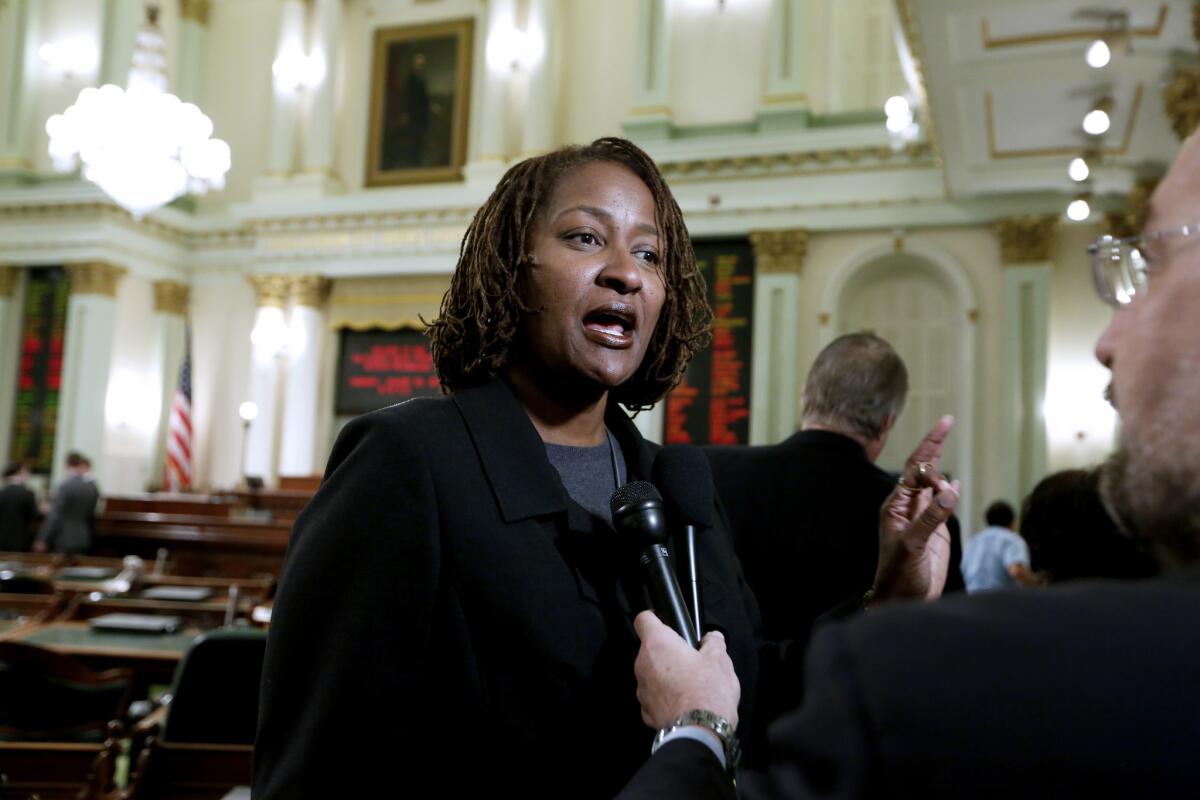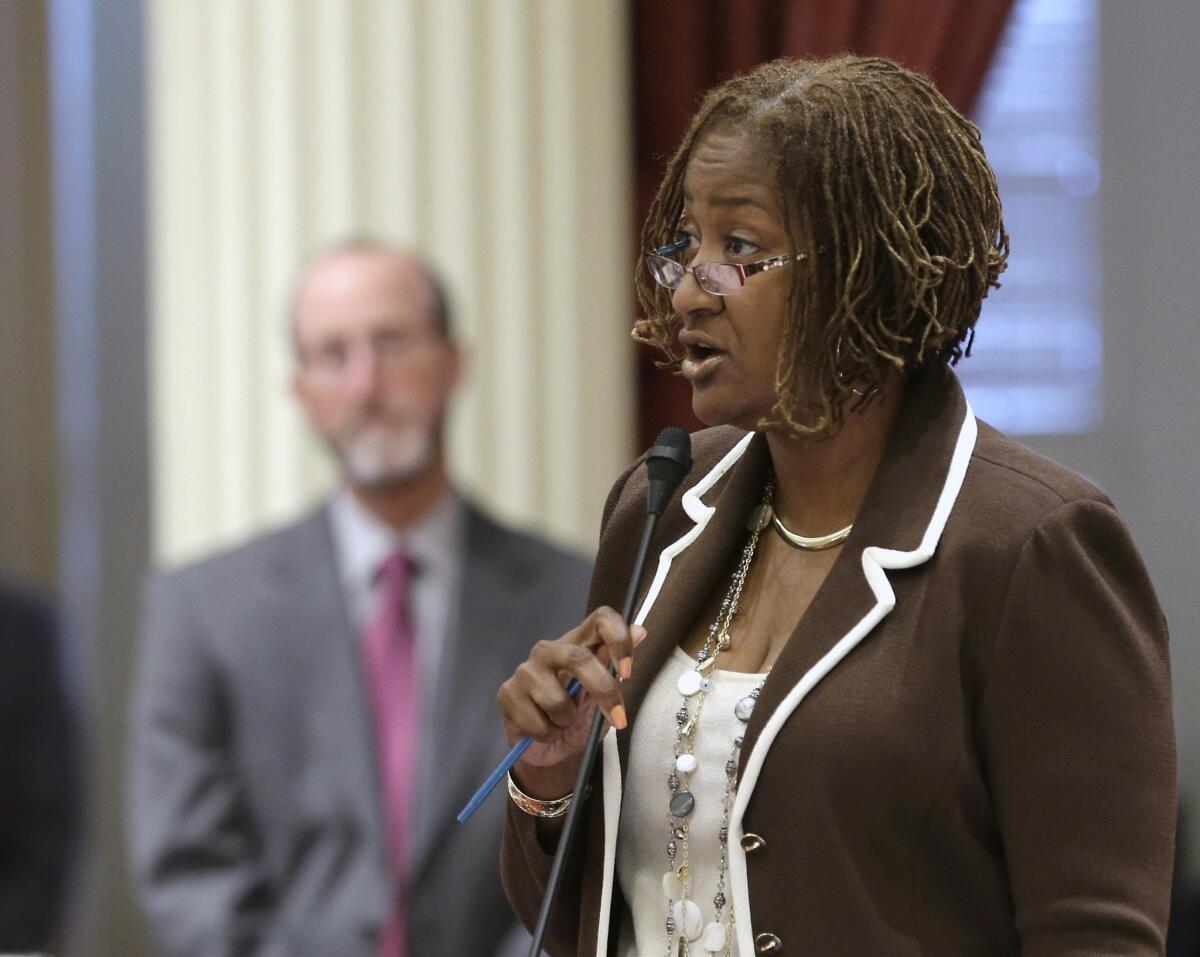How Los Angeles Sen. Holly Mitchell went from the Legislature’s ‘moral compass’ to a top budget crafter

- Share via
Two years ago, Holly J. Mitchell stood on the state Senate floor and, in a crisp, deliberate voice, laced into the budget that her fellow Democrats were poised to approve.
The plan “picks winners and losers,” the state senator from Los Angeles said. “It appears to me that poor people in California and their children continue to be on the losing end of that equation.”
Mitchell had never been shy in urging her colleagues to do more for the poor. But this time, she went even further — withholding her support when the bill came to a vote, a flagrant violation of an unwritten legislative rule among the Capitol’s ruling Democrats that could best be described as “thou shalt not defect on a budget vote.”
The plan passed anyway, and Mitchell could’ve been shunned and made a pariah. But since that rebellion, her influence has only grown. Last year, her signature cause — repeal of a decades-old rule capping aid to certain mothers on welfare — became law. And this year, she was awarded the job she’s long coveted: chair of the Senate budget committee.
“I would describe her as a moral compass and social conscience of the entire Senate, if not the Legislature,” said former state Sen. Mark Leno, whom Mitchell succeeded as budget chair.
Her goal as a legislator has been “to have the tenacity to keep at it,” Mitchell said just before being tapped for the high-profile post. “To stand my ground and not allow negotiation or compromise to water down the policies I’m putting forward.”
But in her new role, compromise is inevitable. She’ll have to own a final budget plan that will undoubtedly fall short in addressing the causes she champions. Her dream job presents a test: As she grows her Capitol clout, can Holly Mitchell still be Holly Mitchell?
“She’s at a different level now,” Senate leader Kevin de León (D-Los Angeles) said. “You still advocate for the people you care about, but you also deal with dollars and cents.”
For Mitchell, 52, standing out is inevitable. For one thing, she is 6 feet tall, female and black — a combination of attributes that is unique among her colleagues.
Unlike many legislators, her cause is not rooted in her biography. Mitchell grew up in Los Angeles in the middle-class home of Edward Mitchell, a career civil servant and Sylvia Johnson, a probation officer who, in 1980, was appointed by a younger Gov. Jerry Brown to lead a women’s state prison in Chino.
“Her mom was in the redemption business. Holly is in the redemption business,” said Frank Mecca, an longtime friend and executive director of the County Welfare Directors Assn. of California. Johnson “was smart and funny and charming and challenging...There’s a lot of Sylvia in Holly.”
After graduating from UC Riverside, Mitchell got her start as an aide to then-state Sen. Diane Watson. She was captivated by the budget wonks whose expertise was the very essence of politics: “Who gets what when.”
Mitchell’s career enabled her to see the budget-making process from multiple angles: as a staffer, as an anti-poverty lobbyist and as a chief executive of Crystal Stairs, a child development nonprofit dependent on state dollars.
Exhausted by the wrenching cuts to her program during the recession, she was compelled to run for office, winning an Assembly seat in 2010 and moving to the Senate in 2014.
“There was no one there, from my perspective — the outside, looking in— that has a really working, deep knowledge of these programs,” she said, “and that’s critical in figuring out how to cause the least harm.”
Her legislation has been unapologetically liberal. She wrote laws to reduce the sentencing disparity between powder and crack cocaine, limit the assets police can seize from individuals not convicted of a crime and expand access to contraception.
Her hardest-fought victory, which came last year, centered on the “maximum family grant,” a ’90s-era welfare law that denied additional benefits for women if they had children while already receiving public assistance.
Rolling back the law, which was rooted in the pejorative stereotype of “welfare queens,” would cost the state more than $200 million a year. It took Mitchell and her allies four years to win its repeal, persuading not just the fiscally wary Brown, but also her own Democratic leaders to prioritize her effort.
“Holly had to ruffle feathers,” Mecca said. “She did the hard work of telling Democrats, ‘You have to do this.’”

Mitchell can be blunt, even biting. Just as often, she’s funny. Once, after hearing that a colleague announced plans to introduce a bill months in advance, she sarcastically likened the move to how a dog marks its territory.
She’d never send such a premature signal because, she explained to a visiting group of criminal justice reform advocates, “I don’t have penis envy.”
“She gets away with saying some things that I would never get away with,” said state Sen. Toni Atkins (D-San Diego), one of Mitchell’s closest friends in the Legislature.
That candor is just as much political acumen as personality trait. Nancy McFadden, a top aide to Gov. Brown, said the administration most appreciates how Mitchell “doesn’t play games. And because of that, we know if we’re going to have a collision [or] if we’re going to be able to figure a way out.”
Her frankness finds an unlikely kindred spirit in Brown, her frequent sparring partner.
“As direct as she is, he’s very direct, too,” McFadden said. “He sees her as somebody who knows what she’s talking about, so he does like to hear her views. They can kind of rib each other, in a nice way.”
In a statement, Brown praised Mitchell as “remarkably effective. She gets stuff done and represents the people of her district with courage and persistence.”
Advocates for social services such as child care and early education are unsurprisingly elated by Mitchell’s new role. They see her as one of their own — someone who did time in the trenches running a nonprofit and carried their banner as a legislator.
But Mitchell takes pains to temper their expectations.
“I’m sure a good number of you read that press release [and thought] ‘Ooh, Holly’s the chair of Senate budget. I'll just get back in bed...because we’re great. She’s just going to make it all happen,’” she told a room full of advocates in January. “Help me help you. Don’t sit back and figure, ‘Oh, they’ve got this.’”
Mitchell’s urging is rooted in the understanding that she’ll be closely watched this year to see how she makes the transition from anti-poverty warrior to a more well-rounded steward of the budget. Allies say the change is not as drastic as it may appear.
“I don’t perceive a tectonic difference in the way she has to approach her job,” Mecca said. For all her doggedness, he said, “she can be very pragmatic and realistic in terms of taking small victories along the way.”
But it’s hard to see her reprising some of her more provocative stands on principle, like her abstention on the 2015 budget. Mitchell said she was protesting a deal that was skimpier than the one legislators had originally agreed on. Her defection caught Senate Democratic leaders off-guard.
“Naturally at the time, I was not terribly thrilled,” De León said.
Nevertheless, after a conversation last year about the job’s “scope and responsibility,” De León appointed Mitchell as chair. Both legislators struck a similar wait-and-see tone when Brown rolled out his initial budget proposal in January. The final deal is due mid-June.
Mitchell doesn’t anticipate championing a signature issue in this year’s budget, as she had done with the maximum family grant. As chair, she said her role would be more managerial and focused on elevating her colleagues’ priorities.
Other limitations await. The first is the job itself, which, while key to shepherding the budget through the Legislature, typically is left out of the final deal-making among the governor and Senate and Assembly leaders.
The second is the increasingly wobbly fiscal outlook for the state. Brown’s administration is projecting a budget shortfall for the first time in five years. And it's not hard to imagine action out of Washington — President Trump’s broad threats to strip California of federal dollars, or a drastic overhaul in national healthcare policy — tipping the budget from shaky to shattered.
But that budgetary vise might enable Mitchell to make the biggest impact. Deciding where to spend extra dollars in good years doesn’t require the same precision as determining what to save in difficult times.
“She has the capacity to look at the most vulnerable and make sure they’re not ignored,” said former Assembly Speaker John A. Pérez. “That’s important in good times. That’s essential in times of crisis.”
Follow @melmason on Twitter for the latest on California politics.
California's budget deficit is back, Gov. Jerry Brown says
California voters just approved more taxes, but the new state budget could still be lean on cash
Political Road Map: What does the state spend more money on, prisons or schools?
Get the L.A. Times Politics newsletter
Deeply reported insights into legislation, politics and policy from Sacramento, Washington and beyond. In your inbox twice per week.
You may occasionally receive promotional content from the Los Angeles Times.





